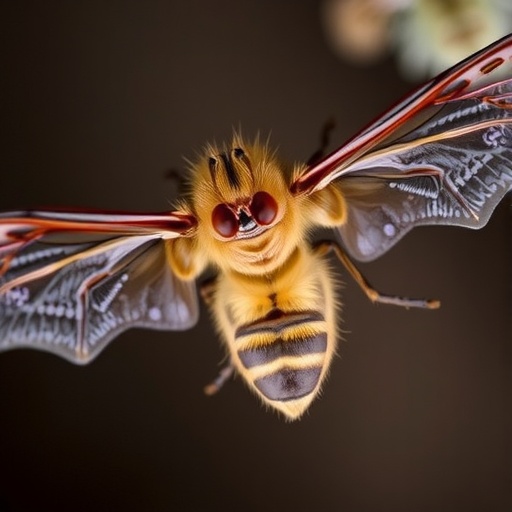In a groundbreaking study published in the prestigious journal International Microbiology, researchers have unveiled intricate details about the microbial networks in bat flies inhabiting North Africa. The research, carried out by an international team led by renowned experts Corduneanu, Bendjeddou, and Sándor, dives deep into the unique interplay of microbial communities associated with bat flies that have varying degrees of host specificity. This work has significant implications for understanding ecological interactions and the evolution of host-microbe relationships in a changing environment.
The study’s pivotal focus is on the microbial diversity harbored by bat flies, which are ectoparasites known to inhabit the fur of bats. These parasites are not merely passive passengers; they play a crucial role in the ecosystems where they reside. The research team meticulously collected samples from different species of bat flies to discern how their host-specific behaviors influence the composition and structure of the microbial communities associated with them.
Researchers employed advanced metagenomics and high-throughput sequencing techniques to profile the microbial communities linked with the bat flies. By analyzing DNA from both the flies and their hosts, the team was able to reveal a complex tapestry of interactions. This methodological approach allowed them to identify specific microbial taxa that were enriched or diminished based on the specificity of the bat flies to their hosts. The findings highlight the intricate relationships that exist between parasites and their hosts on a microscopic level.
The results are particularly fascinating when considering the differing degrees of host specificity among the bat flies studied. Some bat flies are highly specialized and only infest particular bat species, while others are more generalist and can thrive on multiple hosts. The researchers discovered that more specialized bat flies tended to harbor a more homogeneous microbial community, indicating that host specificity can drive microbial consistency. In contrast, generalists exhibited a more diverse microbial landscape, which may enhance their adaptability to various host environments.
This discovery prompts intriguing questions about the evolutionary pressures that shape microbial diversity in parasitic relationships. Understanding how host specificity affects microbial communities can provide insights into the co-evolution of parasites and their hosts. This research contributes not only to the field of microbiology but also to evolutionary biology, as it sheds light on the dynamics of host-parasite interactions in natural ecosystems.
Moreover, the implications of these findings extend beyond academic interest. As anthropogenic changes continue to alter habitats and the distribution of wildlife, understanding these microbial interactions is critical for biodiversity conservation. The health and stability of ecosystems depend on understanding the roles that parasites like bat flies play in maintaining microbial balance. The loss of biodiversity, often exacerbated by human activity, could lead to unforeseen consequences for microbial network structures in these delicate ecosystems.
The research emphasizes the importance of microbiomes in eco-health, highlighting their role in nutrient cycling, pathogen resistance, and overall ecosystem functionality. The results underscore the potential for microbial communities associated with parasites to serve as indicators of environmental health and biodiversity. This reinforces the need for comprehensive studies that consider not only the pathogens themselves but also their microbial companions.
As an extension of their study, the researchers recommend future investigations into the functional roles of the identified microbial taxa. Understanding how these microbes interact with one another and their hosts can offer greater insight into their ecological functions. The connection between microbial diversity and ecological resilience is an area ripe for exploration, particularly in the face of climate change and habitat loss.
The team also advocates for interdisciplinary approaches, integrating microbiology, ecology, and evolutionary theory to unravel the complexities of these relationships further. Collaborations among ecologists, microbiologists, and conservationists can yield a more holistic perspective on how to approach biodiversity conservation in an era defined by rapid environmental change.
Ultimately, this significant research contributes to the broader discourse on conservation biology and the vital importance of preserving ecological networks. It highlights that every species, including bat flies, plays a vital role in the tapestry of life. By advancing our understanding of these interactions, we equip ourselves with the knowledge needed to safeguard fragile ecosystems against impending threats.
In conclusion, the research presents compelling evidence that host specificity in bat flies is intricately linked to the composition and structure of their associated microbial communities. This pioneering work not only enriches the scientific community’s understanding of bat fly ecology but also establishes a foundation for future studies aimed at unraveling the complexities of host-microbe interactions. Furthermore, it reinforces the necessity of considering microbial networks in conservation efforts, ensuring that we maintain the intricate balance of life on our planet.
In this age of ecological crisis, studies such as this emphasize the interconnectedness of life and the importance of preserving every thread in the intricate web of biodiversity. The knowledge gleaned from studying bat flies holds the potential for far-reaching implications in environmental science and conservation strategies, ultimately contributing to the sustainability of our natural world.
Subject of Research: Microbial network assembly in bat flies with differing host specificity from North Africa.
Article Title: Microbial network assembly in bat flies with differing host specificity from North Africa.
Article References:
Corduneanu, A., Bendjeddou, M.L., Sándor, A.D. et al. Microbial network assembly in bat flies with differing host specificity from North Africa.
Int Microbiol (2025). https://doi.org/10.1007/s10123-025-00720-0
Image Credits: AI Generated
DOI: https://doi.org/10.1007/s10123-025-00720-0
Keywords: microbial networks, bat flies, host specificity, metagenomics, biodiversity, ecology.




